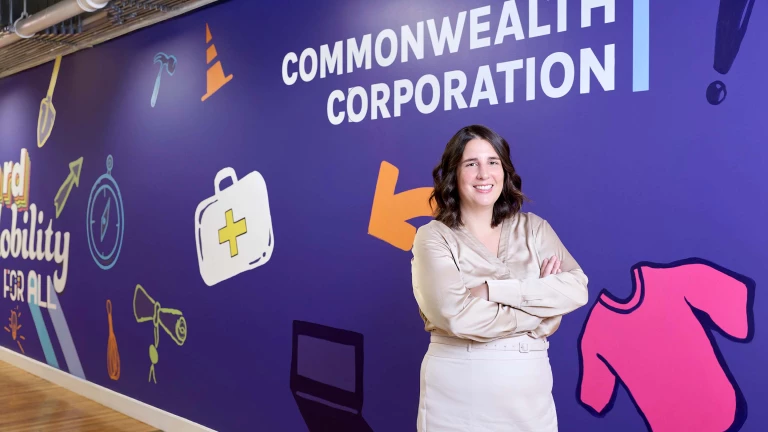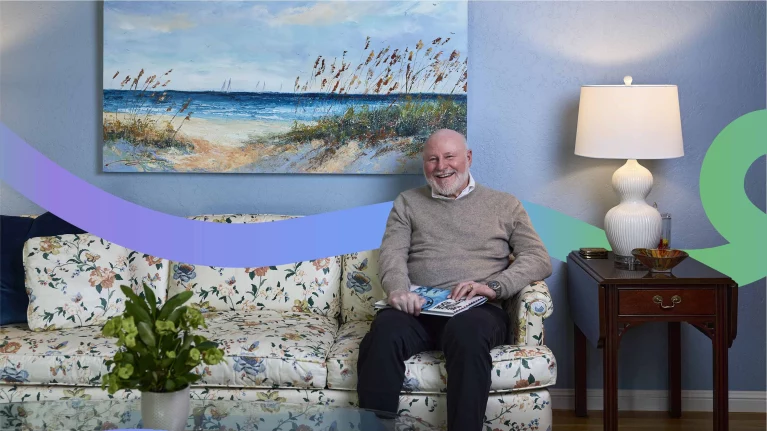As president and CEO of Massachusetts’s Commonwealth Corporation, Molly is leading workforce development and upskilling efforts that empower and uplift diverse communities
Molly Jacobson’s journey to become president and CEO of Commonwealth Corporation (CommCorp) started on a farm—specifically, on her family’s farm. Molly grew up in Massachusetts working weekends and summers at her uncles’ diversified fruit and vegetable farm, which happens to be one of the largest growers of heirloom tomatoes in New England.
That meant Molly’s earliest work experiences involved tasks such as hauling hay bales and staking up tomato plants. Putting in a hard day’s work doing manual labor kept her humble, and Molly says she gained valuable exposure as part of a diverse farm workforce that included seasonal workers from Jamaica and Guatemala.
From her parents—a public school teacher and a librarian—Molly learned the importance of education, and she recognized an ambition to make the world a better place. “I had taken time away during college to work in a public middle school in Queens and thought I would pursue a career as a teacher, but I wanted to explore how to best have impact,” she says. “A family friend encouraged me to invest in building a good foundational toolkit, and BCG seemed like the best place to learn those skills, which is why I joined the firm when I was 22 years old.”

Gaining the Gift of Perspective
Molly stayed at BCG for 14 years, rising to become a partner in the Boston office. She gained an invaluable gift of perspective from working with dozens of different clients and managers at BCG to tackle projects for all sorts of companies and organizations. “With that mosaic of experiences, you build muscles for how to resolve certain types of problems. You realize that data sets are never perfectly clean, and the path forward on a project is often unclear. You learn how to be calm and chart a way forward regardless,” Molly explains.
Through her experiences at BCG, Molly decided that state government was the place where she could drive the most impact. In early 2024, she left BCG to become president and CEO of CommCorp, a quasi-public agency in Massachusetts that provides and administers a wide range of professional development and training programs that enable unemployed and underemployed individuals to achieve upward mobility while also meeting the skilled labor needs of Massachusetts’s businesses.
At a practical level, this means CommCorp administers eight different state job training programs. It operates certain programs directly and also distributes over $70 million in annual grant funding toward workforce development programs across the state. Molly leads a team of 75 FTEs (Full-Time Equivalents) who work with hundreds of training organizations to serve up to 50,000 individuals and 3,000 businesses per year.
Focusing on Operational Excellence
It may seem like a big leap transitioning from consulting to workforce development, but Molly sees it as a totally natural transition. “I think of BCG as being a best-in-class training organization,” she says. “BCG taught me that there is a recipe for teaching new hires how to tackle tough strategic problems at the highest level. That recipe starts with training. My assumption is that everybody can be great, and I just need to figure out what training or coaching they need to excel.”
Indeed, Molly says that BCG taught her the core skills she uses on a daily basis—from analyzing and breaking down complex questions to identifying the most salient data and taking decisive action.
Today, she is using those skills to strengthen operational excellence at CommCorp, with a vision to ensure seamless grant making, fast payments, great data collection, and strong participant outcomes.
Molly is focused on impact both now and in the future. “The job placement rates and wage gains from our workforce training programs are fantastic. For example, over 80% of graduates from one vocational training initiative get jobs almost immediately after graduation,” she notes. “The question that I’m pushing our agency to answer is, ‘How we can maintain the success of these training programs while also evolving them to meet the needs of Massachusetts’s economy?’ This means giving workers the right skills and supports, like digital literacy, or career-focused English for speakers of other languages. It also means funding training in high-need areas like health care or advanced manufacturing.”

Bridging Training Gaps
Molly has chosen to donate her $5,000 BCG Alumni Award prize to the Commonwealth Corporation Foundation, a 501(c)(3) branch of the Commonwealth Corporation that can accept philanthropic dollars and use those funds to fill gaps in the workforce development landscape.
For example, one of the major programs that CommCorp runs is the Workforce Training Fund Program, which gives small businesses grants to train or upskill their existing incumbent workers. Businesses that meet the eligibility criteria can send any member of their staff to get trained in topics such as project management, lean manufacturing, and customer service.
“Participation in the Workforce Training Fund Program is open to any business that contributes to unemployment insurance taxes in Massachusetts,” explains Molly. “But there are a lot of nonprofit organizations and municipalities that could really benefit from incumbent worker training. Normally, they would not have access to the CommCorp grants because they don’t pay into the state’s unemployment fund, but the Foundation can bridge that gap by making grants to help these nonprofit employees and city workers access the same sort of upskilling opportunities that are available in the private sector.”
The Many Dimensions of Empowerment
Empowerment has many meanings and applications for Molly. There are the CommCorp workforce development programs that empower key populations such as unemployed jobseekers, formerly incarcerated individuals, and young adults with disabilities to enter or re-enter the workforce. "Our program participants have tremendous potential to contribute to an employer, but they just need support,” says Molly. “We fund community-based organizations and nonprofits who start working with these individuals to provide not just job training for in-demand occupations, but also soft skills such as how to work with a supervisor or handle conflict in the workplace. Typically, our grantees also provide wraparound supports, which could include anything from help with housing to transportation vouchers to work-appropriate clothing.”
Molly also sees empowerment in terms of supporting the internal team at CommCorp, removing obstacles and creating spaces for her experienced program managers and directors to meet the needs of the constituents they serve.
Another dimension of empowerment encompasses inclusion. More than 60% of CommCorp’s staff are women, approximately 50% are people of color, and over 10% have reported a disability. “My vision for inclusion is supporting this tapestry and making sure we reflect the communities we serve in Massachusetts,” she reveals.
As a leader, Molly is also committed to creating an environment where everyone has a chance to thrive. “BCG taught me that if you want to offer equal opportunities in your organization, you have to ensure processes and procedures allow for that,” she says. “For example, a transparent salary scale and structured performance reviews can help employees figure out where they stand, which strengths they already have, and which areas they many need to work on to improve their performance.”

Taking Existing Programs to the Next Level
Today, Molly is working to take existing CommCorp programs to the next level. For example, with support from the Healey-Driscoll Administration, CommCorp helped launch a pilot to give stipends to workforce training participants to help them pay for childcare and/or transportation while they get upskilled.
CommCorp also recently began funding vocational ESOL—English language education for speakers of other languages—that’s integrated with job readiness training.
As CommCorp modernizes its operations and launches new initiatives, interest in its programs is surging. Molly notes that CommCorp now has three times more applicants than available slots for several of its grant programs.
Ultimately, everything that CommCorp does to help individuals improve their skills also benefits businesses in Massachusetts by making it easier for them to find the talent they need to grow. “There’s a perpetual need for skilled workers,” Molly declares. “At CommCorp, we try to meet that need by offering the workforce development programs that businesses and job seekers need most. We work toward a world where meaningful employment can lead to upward mobility for all.”












